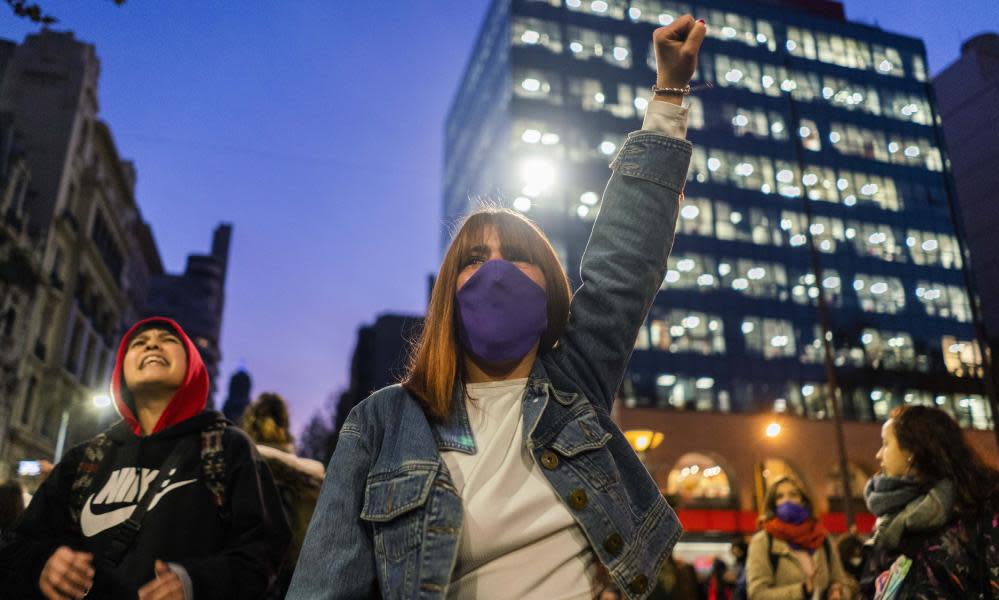#NiUnaMenos five years on: Latin America as deadly as ever for women, say activists

It has been five years since pent-up fury over staggering levels of violence against women erupted in a wave of public protest across Argentina under the slogan Ni Una Menos (Not One Less).
What started as a hashtag quickly grew into a movement, pushing women’s rights to the top of the agenda in Argentina, before quickly spreading across South America as millions of women took a stand against gender violence.
Related: How Argentina rose up against the murder of women
But five years later, Latin America remains one of the most dangerous places in the world for women. One in three women in the region have been subjected to violence and between 17% and 53% of women have reportedly experienced domestic violence.
In recent weeks, strict coronavirus lockdowns across Latin America have compounded the problem, as women find themselves trapped at home with their abusers.
Activists say the movement’s message is more urgent now than ever. On Wednesday, Argentina’s largest newspaper, Clarín, published the names and stories of more than 300 women who have been murdered in the last year as part of a special obituary section.

Marta Montero is still fighting for justice for her 16-year-old daughter Lucia Pérez, who was drugged, gang-raped and murdered in 2016. Outrage over that crime prompted the country’s first national women’s strike, but the three men accused of assaulting Lucia were eventually acquitted of murder. Two of them were convicted of selling drugs to a minor.
Today, a woman is killed every 30 hours in Argentina, and Montero said she often thinks of all the others who have died since Lucia was killed.
“I try not to be a pessimist, but unfortunately things have gotten much worse,” she laments, speaking from her home in the coastal city of Mar del Plata. “There’s just much more violence against women.”
At his inaugural address, Argentina’s president Alberto Fernández praised Ni Una Menos as a flag that everyone should be waving. He established a new Ministry of Women, Gender and Diversity, which runs a helpline for victims of violence and works to shift attitudes through education campaigns.
“You can see the changes,” said Andrea Lescano, whose daughter Micaela Garcia was murdered in 2017. Her death prompted Argentina to pass a law requiring all government workers to undergo gender sensitivity training. Universities and other places of work are developing protocols to deal with gender violence in their spheres.
“It’s not that there is more violence, it’s that now you’re seeing it and naming it,” says Lescano.
Marta Dillion, a founder of the Ni Una Menos movement, sees important progress in these past five years. “Blaming the victim is no longer possible,” she says.

Argentina is not the only country where Ni Una Menos has helped spur on positive change for women. In Chile, the movement has contributed to the organisation of a forceful group of women’s rights collectives, who have played a key role in mass demonstrations over equality and high costs of living.
Earlier this year, activists succeeded in pressuring political groups to ensure gender parity in the construction of Chile’s new constitution. If the country votes in favour of such a reform during the historic referendum in October, it would make the constitution the world’s first to include gender parity.
But there is no assurance that such measures will automatically curb femicide rates and shift cultural attitudes.

Mexico’s president, Andres Manuel López Obrador, a populist leftwinger, appointed the first cabinet with gender parity in Latin America when he assumed office last year.
Mexico has seen a wave of assertive protests by women’s groups, who credit Ni Una Menos with amplifying their voices – but many activists still feel like they are not being heard. “As a first step, we want authorities to recognise there is a problem and that violence against women is increasing,” says Arussi Unda, who belongs to a Veracruz-based organisation, Brujas del Mar.
Lopéz Obrador has been criticised for failing to address entrenched violence against women: when calls to domestic violence helplines spiralled during the coronavirus lockdown, the president dismissed such reports as “90% fake”.
Related: 'This is our feminist spring': millions of Mexican women prepare to strike over femicides
Femicide laws exist in Mexico, yet impunity rates of over 90% point to their ineffectuality.
The problem was highlighted earlier this year in a sobering viral video, showing a woman named Yesenia Zamudio pleading for justice for her daughter’s murder, which was dismissed by authorities as suicide four years ago. “I don’t need a collective, I need a fucking political party that represents me,” she cries in the video.
Zamudio’s frustration is echoed by Montero, the mother in Argentina. “If we had achieved a change in the past five years, we wouldn’t have to keep fighting for one less death,” she says.
Dillion, one of the Ni Una Menos founders, agrees there is still a lot of work to do. “Femicides are still happening because it’s a form of disciplining,” she says. “In general, the killer acts when a woman says: ‘enough’.”

 Yahoo News
Yahoo News 
